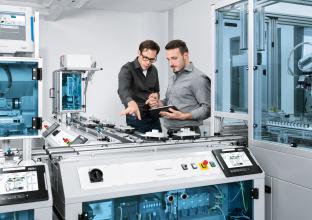
How does Leadership 4.0 work?
Economic researchers estimate that in 2030 up to one third of all employees worldwide will have to look for a different job because digitalisation and Industry 4.0 will have made their jobs obsolete. It is therefore all the more important for all managers to inspire and motivate their employees and support them on their journey to the new world of work. And how can automation technology companies develop during this process?
The good news is that the 400 million jobs that may be lost will be more than compensated for. Experts predict that digitalisation will provide a real job miracle and create up to 900 million new jobs, albeit with different qualifications than those we have been familiar with so far.
Millennials also have very different expectations of the world of work compared to previous generations. Companies can only attract the best talent from among those with high potential by offering attractive opportunities for work-life balance, social media and collaboration, respect, learning and development.
The VUCA world
Nowadays politics and the world economy are characterised by their unpredictability. ”We are talking about the VUCA-world, a world that is becoming increasingly volatile, uncertain, complex and ambiguous”, explains Xavier Segura, General Manager of the Festo Cluster Spain/Portugal.
If companies want their management structures to still be successful in ten years time, they have to adopt a Leadership 4.0 model. The main goal is to create a sense of belonging. This includes demonstrating confidence in employees and transferring more and more responsibilities to them.
Managers = influencers in digital transformation
Key competencies pave the way for the change towards Leadership 4.0. Managers must see themselves as influencers and act accordingly. They need to inspire their employees to continue learning and developing. As influencers, they encourage organisations to take advantage of extensive data networking. As a result, they will promote simple, open and honest communication across all levels of the company.
“What does digital transformation mean for us at Festo?” Segura asks before continuing: “If Festo still wants to be successful in 10 years, what do we have to change, learn, create or stop today”? Festo has already launched several initiatives – Segura himself leads an international working group of managers from different countries under the name "Festo Leadership Programme".
Design Thinking
Digital transformation is not a scientific concept, but the umbrella term for very real and fast-moving changes. Agile working methods help with being more effective and focused in shorter time spans. Skills such as creativity, innovation, dealing with complexity and self-management are becoming more important than ever. Numerous organisational obstacles reduce the ability to focus on users and customers. Design Thinking reinforces this approach, since it is a method that helps to solve complex problems, develop new ideas and find innovative concepts. At Festo, Design Thinking aims to promote innovation, cooperation and customer focus.
For Festo, digital transformation has an even greater significance. New hardware products and digital services are created using agile methods such as Design Thinking, and pneumatic products are fused with digital tools, as in the revolutionary Festo Motion Terminal. Its pneumatic functions are controlled by motion apps, saving on up to 50 individual components. Interdisciplinary development teams are creating new software tools for factory and process automation. These include Smartenance, Dashboards and Projects with real-time solutions and new billing and payment methods.
Digitalisation know-how with Festo Didactic
Another main aspect of the digital transformation at Festo is to prepare customers for the age of digitalisation. That is why Festo Didactic offers turnkey learning factories, laboratory facilities, innovative learning systems, e-learning and training courses. The cyber-physical learning platform CP Factory, for example, models the stations of a real production plant and allows people to learn plant programming, networking as well as many other topics such as energy efficiency and data management.
By developing specific competencies, employees can be supported in the change process Industry 4.0. With customised training programs, tailor-made content and a comprehensive consulting approach, Festo Didactic helps companies to ensure their specialists have the right qualifications for digital production. Trainers benefit from course concepts for Industry 4.0 technologies based on the CP Factory. In addition, Festo Didactic provides support in determining the Industry 4.0 maturity level with an online test for companies and advice on what actions to take.
About Festo:
Festo is a global player and an independent family-owned company with headquarters in Esslingen am Neckar, Germany. Festo has set standards in industrial automation technology and technical education ever since its establishment, thereby making a contribution to sustainable development of the environment, the economy and society. The company supplies pneumatic and electrical automation technology to 300,000 customers of factory and process automation in over 35 industries. The LifeTech sector with medical technology and laboratory automation is becoming increasingly important. The products and services are available in 176 countries.
With about 20,700 employees in over 250 branch offices in 61 countries worldwide, Festo achieved a turnover of around €3.36 billion in 2021. Each year around 7% of this turnover is invested in research and development. In this learning company, 1.5% of turnover is invested in basic and further training. Festo Didactic SE is a leading provider of technical education and training and offers its customers worldwide comprehensive digital and physical learning solutions in the industrial environment.
About Festo Spain/Portugal:
Festo Spain was founded in 1971, Festo Portugal in 2011. Today, the sales company with headquarters in Barcelona and Porto and a branch office in Bilbao in the Basque Country, has more than 190 employees and a turnover in 2021 of €75 million. It works with 139 distributors throughout the Iberian Peninsula. The most important industry segments are food and packaging, automotive and machine tools. For Festo, the Iberian Peninsula is the second most important automotive market in Europe after Germany. There are strong food & packaging OEMs, leading companies in flexible packaging as well as worldwide leaders in water treatment.



